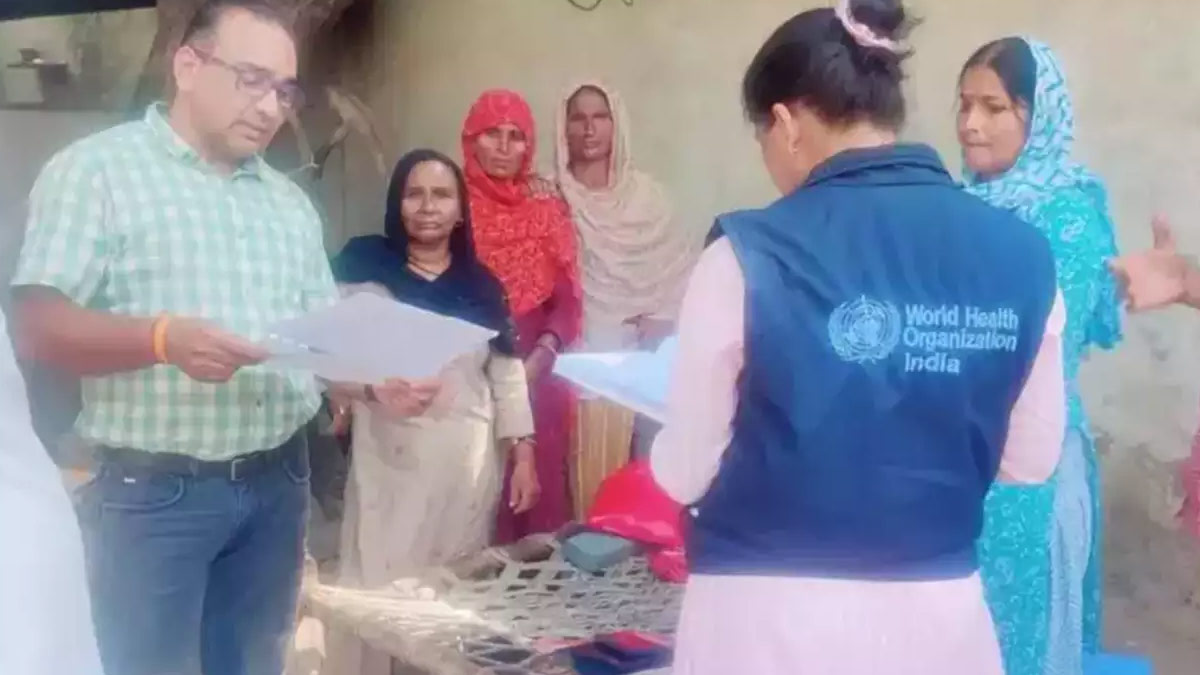In a tragic turn of events, Rajasthan’s Deeg district has witnessed the deaths of seven children within the span of a month due to a diphtheria outbreak. To address the alarming situation, a team from the World Health Organization (WHO) has been deployed to the area. Alongside the WHO, the state health department has intensified efforts to contain the disease, with vaccination drives being a central strategy to combat further spread.
The Diphtheria Outbreak: A Growing Concern
The outbreak first came to light on September 14, when the district’s Chief Medical and Health Officer (CMHO), Vijay Singhal, confirmed the death of a child from diphtheria in the Kaman region. Since then, the situation has worsened, with a total of 24 cases testing positive for the bacterial infection. Health authorities quickly ramped up screening efforts in Kaman and nearby areas, seeking to curb the spread of the deadly disease.
However, the region’s reluctance toward vaccination has been a significant hurdle in the fight against diphtheria. According to Singhal, “Diphtheria has been preventable with vaccination, but there is a persistent belief in local superstitions that causes people to avoid vaccinating their children.” This resistance has complicated the efforts of health officials, who have struggled to convince local residents to prioritise immunisation.
Public Health Efforts and Challenges
Multiple vaccination campaigns have been conducted in the Deeg district, yet the uptake of vaccines has remained worryingly low. Despite persistent outreach, public resistance, rooted in long-standing superstitions about vaccines, has limited the success of these drives. Health workers have faced opposition from the community, further delaying the containment of the outbreak.
Diphtheria, an easily preventable disease, has become a serious threat to the children of this region, affecting newborns up to teenagers as old as 16. This preventable disease poses an ongoing risk not just due to local myths surrounding vaccination, but also because of the severity of the infection itself.
Also Read: Tragedy in Punjab: 3-Year-Old Succumbs to Diphtheria in Ferozepur
Understanding Diphtheria: Symptoms and Risks
Diphtheria primarily affects the respiratory system, with the bacteria infecting the throat and nose. Upon infection, the bacteria begin to release toxins that destroy healthy tissue. Within just a few days, this process forms a thick, grey coating known as a “pseudomembrane,” which can obstruct the throat and make it difficult to breathe or swallow.
The onset of symptoms includes sore throat, fever, weakness, chills, and swollen glands in the neck. In advanced cases, the bacterial toxin can travel through the bloodstream, leading to severe complications such as damage to the heart, nerves, and kidneys.
In Deeg, the lack of prompt treatment has been deadly. As these toxins spread, they can cause irreversible damage to vital organs. Without immediate intervention—through antibiotics and an antitoxin designed to neutralise the bacterial toxin—the prognosis for infected children worsens significantly.
The Importance of Vaccination and Treatment
The cornerstone of preventing diphtheria is vaccination. Vaccines offer robust protection, yet the ongoing hesitancy in the region has made outbreaks more likely. Despite organised vaccination campaigns, the low turnout has created a situation where diphtheria, a disease largely eradicated in many parts of the world, continues to thrive.
Also Read: WHO Report: Vaccines Play Key Role in Cutting Antibiotic Use and Fighting Resistance
Beyond prevention, the treatment for diphtheria involves a combination of antibiotics to fight the bacterial infection and an antitoxin to neutralise its effects. These treatments, when administered early, can save lives. Unfortunately, many in Deeg district are not seeking medical attention early enough, exacerbating the situation.
Moving Forward: Containing the Outbreak
The arrival of the WHO team, alongside state health officials, represents a critical step in the containment of the diphtheria outbreak in Deeg. Their immediate goal is to vaccinate as many children as possible and educate the community on the dangers of refusing vaccines. Health workers continue to advocate for widespread immunisation, emphasising the need to overcome local superstitions for the greater good of public health.
In addition to vaccination, screening for diphtheria cases and early treatment are now underway in an effort to save lives. The involvement of international health organisations like WHO provides additional resources and expertise, hopefully leading to a turning point in this public health crisis.
Bottomline
The tragic deaths of seven children in Deeg highlight the devastating consequences of vaccine hesitancy. With diphtheria outbreaks still posing a threat, the situation in Rajasthan serves as a stark reminder of the importance of immunisation and the dangers of delaying medical intervention. The joint efforts of the WHO and state health teams offer hope that this outbreak can be contained, but overcoming deep-rooted beliefs and resistance to vaccination remains a significant challenge.
